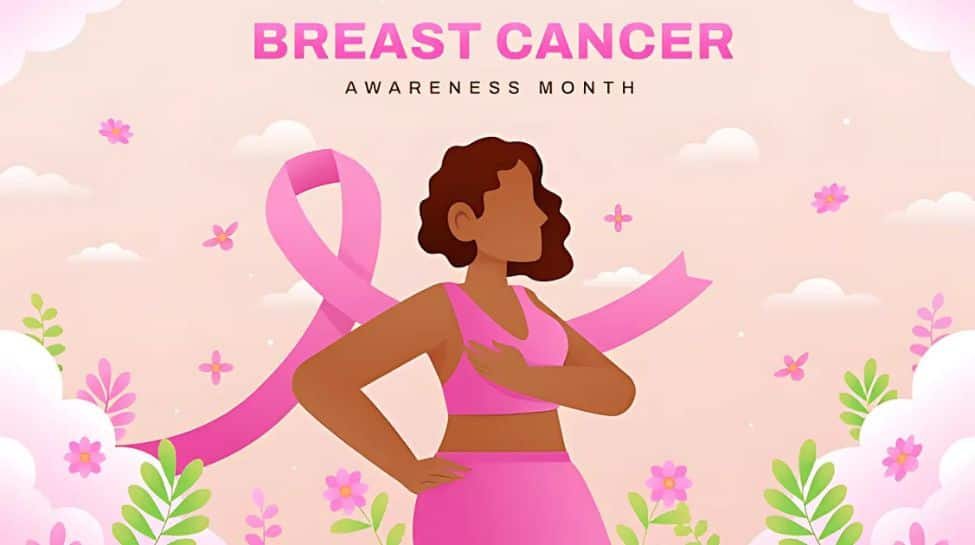Breast Cancer Awareness Day, celebrated annually during the month of October, plays a crucial role in raising awareness about breast cancer, its prevention and early detection. This day serves to remember the importance of regular screening, self-examinations, and timely medical checkups to detect breast cancer in its early stages.
Before we delve into lesser-known facts about breast cancer, let’s quickly review what we already know: Breast cancer is the most common cancer in India, surpassing oral and cervical cancer, and it is also the leading cause of cancer-related deaths. cancer.
Dr. Kabir Rehmani, Surgeon Oncologist, Fortis Hospital Greater Noida, emphasizes that “breast cancer has an excellent outcome (completely curable) if diagnosed early.” It also highlights how screening tools like mammography have revolutionized early detection, significantly improving survival rates.
Self-examination, combined with timely clinical checkups by healthcare providers and regular mammograms, has become one of the most effective preventive measures for breast cancer.
As October marks Breast Cancer Awareness Month, let’s explore some interesting facts that might surprise you:
1. Not all breast lumps are cancerous
While finding a breast lump can be alarming, most of these lumps, especially in younger women, are benign (non-cancerous). However, if you are over 40, any new lump should be evaluated quickly. It’s also important to remember that breast cancer can still occur in younger women, so surveillance is key at any age.
2. Only between 5% and 10% of breast cancers are hereditary
Contrary to popular belief, most women with breast cancer did not inherit the disease. Family history increases the risk, but is not a guarantee. If you have close relatives who have had breast cancer, you may need to start screening earlier and undergo genetic testing. A woman with a first-degree relative (parent, brother, or child) who has had breast cancer is approximately twice as likely to develop it. If several close relatives have suffered from it, the risk triples.
3. Breast removal is not the only surgical option
Mastectomy is not the only treatment option. Today, there are breast conservation surgeries, such as partial mastectomy or lumpectomy, in which only the cancerous tissue is removed, preserving as much healthy tissue as possible. There are also nipple-sparing and skin-sparing mastectomies. Breast reconstruction can often be performed simultaneously with breast removal, offering more options for preserving body image.
4. Men can get breast cancer too
Although rare (incidence 0.5 to 1%), men can develop breast cancer. Risk factors include family history and conditions that increase estrogen levels. The same principles of self-examination and attention to warning signs apply to men, so early detection is equally important.
5. Breast cancer is one of the most survivable cancers
With advances in early detection and treatment, breast cancer survival rates have improved significantly. Survival chances vary depending on the type and stage of cancer, but in general, the prognosis is much better than in the past.
6. Survivors are at risk of a second cancer
Breast cancer survivors have a higher risk of developing a second cancer, either due to side effects of treatment or genetic factors such as BRCA1 and BRCA2 mutations. This is why continuous surveillance and periodic examinations are crucial even after successful treatment.
7. You can reduce your risk of breast cancer
Adopting a healthy lifestyle can help reduce the risk of breast cancer. It is important to exercise regularly, maintain a healthy weight, and reduce junk food and sugar consumption (to prevent obesity). Limiting alcohol and avoiding tobacco also plays an important role. Drinking just one alcoholic drink a day slightly increases the risk, while consuming two to five alcoholic drinks a day increases it by one and a half times.
Don’t be afraid of a breast cancer diagnosis: early detection makes a difference. Be proactive, stay informed and take charge of your health. Remember, breast cancer is curable if caught early.
Disclaimer:
The information contained in this post is for general information purposes only. We make no representations or warranties of any kind, express or implied, about the completeness, accuracy, reliability, suitability or availability with respect to the website or the information, products, services, or related graphics contained on the post for any purpose.
We respect the intellectual property rights of content creators. If you are the owner of any material featured on our website and have concerns about its use, please contact us. We are committed to addressing any copyright issues promptly and will remove any material within 2 days of receiving a request from the rightful owner.

